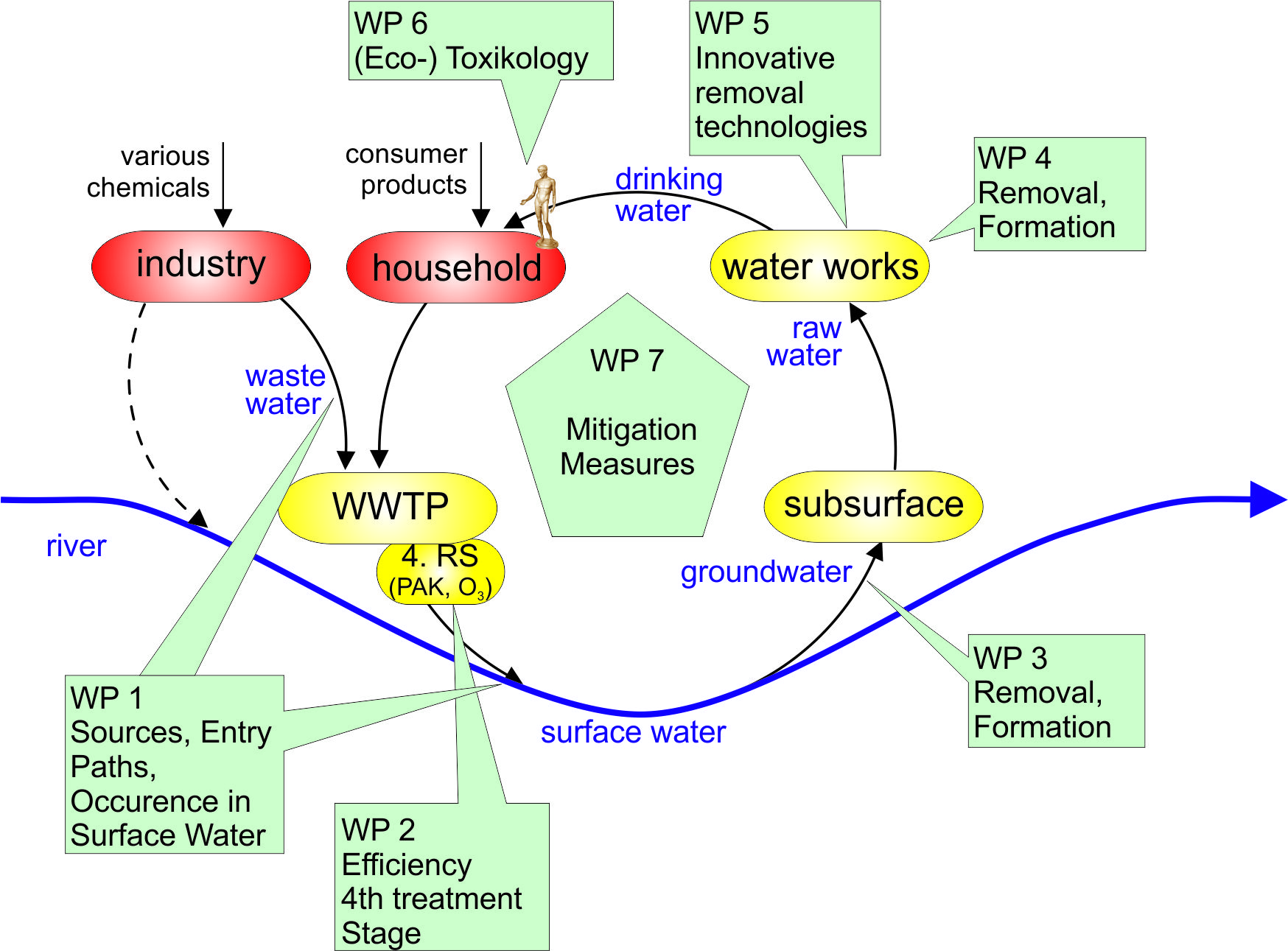![]()
Persistent mobile organic chemicals in the aquatic environment: Sources, occurrence and technical processes for their removal in the drinking water supply (PROTECT)
Water is an essential resource of our planet. However, the discharge of man-made, persistent and mobile organic chemicals (PM substances) into the environment threats the quality of water and thus not only the aquatic environment, but also human health.
![]() Persistent and mobile substances are particularly difficult to remove in partially closed water cycles where they can reach drinking water. However, existing monitoring methods do not fully cover this class of substances. Hence, only very limited knowledge is available on the extent to which PM-substances do indeed reach from waste water to raw or even drinking water. While PM-substances therefore pose a risk to the drinking water supply on the one hand, knowledge about their fate in the entire water cycle is very limited on the other.
Persistent and mobile substances are particularly difficult to remove in partially closed water cycles where they can reach drinking water. However, existing monitoring methods do not fully cover this class of substances. Hence, only very limited knowledge is available on the extent to which PM-substances do indeed reach from waste water to raw or even drinking water. While PM-substances therefore pose a risk to the drinking water supply on the one hand, knowledge about their fate in the entire water cycle is very limited on the other.
Based on the results of the previous research project
PROMOTE
a
consortium of six partners will apply novel analytical methods that are
dedicated to very polar, mobile compounds to screen for PM-substances in all
compartments of the water cycle and to monitor the efficacy of natural and
technical barriers (wastewater treatment, subsurface passage, drinking water
treatment) in removing PM-substances. PM-substances are most critical, if they
are also toxic (PMT-substances). Therefore, prominent PM-substances will be
evaluated for their toxicity and ecotoxicity. Simultaneously, technologies for
the removal of PM-substances from raw water used for drinking water production will be studied in full-scale for their removal
of PM-substances and innovative procedures like membrane separation
will be developed in lab scale. The consideration of the whole water cycle and
the combination with improved removal technologies will eventually allow
recommending a set of mitigation measures to reduce the risk that PM-substances
pose to water resources. Highest priority will be given to PMT-substances.

The consortium will achieve its goals through seven working packages which are arranged along a partially closed water cycle (Fig. 1)
Cooperation Partners
|
Helmholtz Centre for Environmental Research
|
Department Analytik
Prof. Dr. Thorsten Reemtsma Dr. Matthias Muschket Dr. Urs Berger |
|
Hochschule Fresenius
|
Institute For Analytical Research (IFAR)
Prof. Dr. Thomas Knepper Dr. Daniel Zahn |
Umweltbundesamt

|
Fachgebiet II 3.1, Nationale und internationale Weiterentwicklung der Trinkwasserhygiene; Trinkwasserressourcen Dr. Aki Sebastian Ruhl Fachgebiet II 3.6, Toxikologie des Trink- und Badebeckenwassers Jochen Kuckelkorn |
SUEZ Water Technologies & Solutions
.jpg)
|
Uli Dölchow |
|
Kommunale Wasserwerke Leipzig GmbH
|
Heiko Schulze Grit Schnitzer |
|
|
|
Associated PartnersHessenwasser GmbH & Co KG |
Bereich Zentrallabor |
|
Technische Universität Berlin
|
Fachgebiet Wasserreinhaltung
Prof. emeritus Dr. Martin Jekel |
|
Weissenburg in Bayern
|
SG 44 - Stadtentwässerung |
|
Mannheim
|
Kläranlagen Mannheim
Andreas Hein |
Duration of the project: 01/02/2019 - 31/01/2022
This project is funded by the Federal Ministry of Education and Research and is part of RiSKWa in the framework programme of FONA .
Contact partner:
|
Dr. Matthias Muschket Helmholtz Centre for Environmental Research – UFZ Department Analytik Permoserstraße 15 in 04318 Leipzig Phone: +49 341 235 1413 |
Events
- Workshop on PMT-substances: 21 - 22 January 2020. Fore more information follow Link
